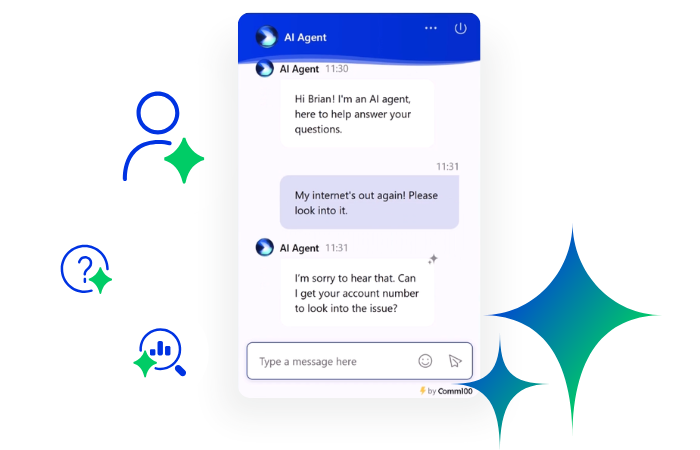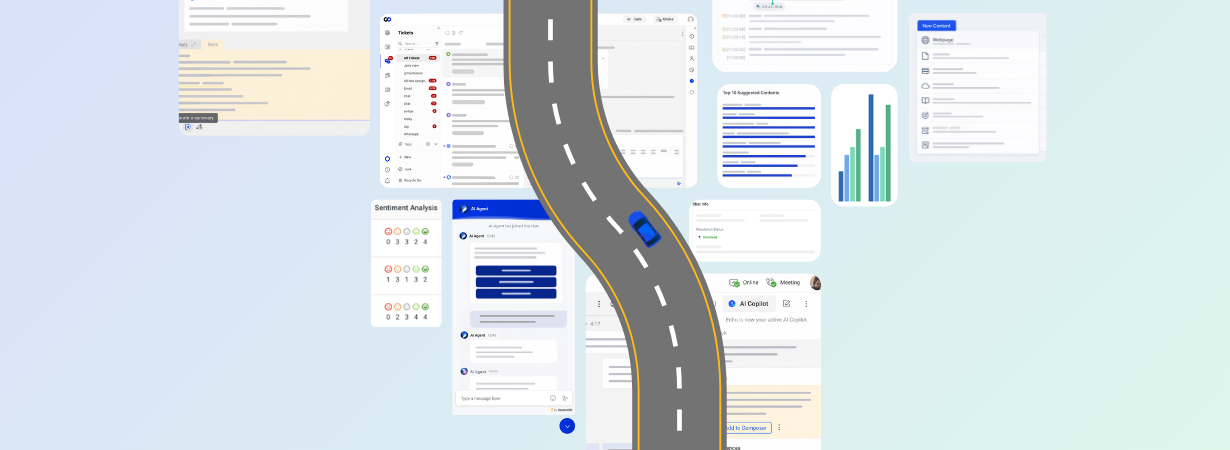Player protection has become the defining challenge for online gambling operators. While compliance teams and detection algorithms work around the clock, one critical resource remains underutilized: customer support teams.
In partnership with SBC Media, Comm100 surveyed industry professionals to understand how operators leverage their support infrastructure for responsible gambling (RG) initiatives.
The findings reveal a striking disconnect: 100% of operators train their agents on RG behaviors, yet over half struggle with the basic technology integration needed to make interventions effective.
In this article, we’ll explore:
- Why 55% of operators cite system integration as their biggest RG challenge, and what it’s costing them
- The monitoring gap: How only 31% use automated tools despite universal agent training
- What operators really want: AI-assisted guidance, triggered workflows, and behavioral flagging
- The specialist access problem affecting 30% of operators and their players
These insights go beyond compliance checkboxes. They reveal how customer support, when properly equipped and integrated, becomes your most valuable asset in protecting players.
The Untapped Power of Customer Support in Responsible Gambling Compliance
Discover insights from industry professionals on how customer support teams can drive more effective responsible gambling strategies and improve player protection.
Read the report
Report
The Importance of Customer Support Staff in Responsible Gambling
Customer support teams sit at the intersection of player experience and regulatory compliance. They handle thousands of conversations daily, spotting behavioral patterns and responding to distress signals that automated systems might miss. Their role in responsible gambling is fundamental.
Universal Training, Fragmented Implementation
Our survey confirmed what many suspected: training has become standard practice across the industry. Every operator we surveyed provides their support agents with training on responsible gaming behaviors and intervention techniques. This represents a significant maturation of industry practices over the past decade.
But training alone doesn’t guarantee effective intervention. The real question is whether operators have built the infrastructure to support what their agents have learned.
The Monitoring Gap
When we asked operators how they monitor customer support interactions for signs of risky player behavior, the responses revealed a significant reliance on manual processes:
- 51.7% use manual review by supervisors
- 31% employ automated sentiment or keyword tracking
- 13.8% reported using other methods (primarily a combination of agent escalation and manual review)
- 3.4% aren’t currently monitoring at all
These numbers expose a critical inefficiency. Supervisors can only review a fraction of daily interactions. Even with the most diligent oversight, high-risk conversations can slip through unnoticed, especially during peak hours or when agents are managing multiple chats simultaneously.
The 31% using automated tracking tools represent the leading edge of the industry, but that still leaves more than two-thirds of operators dependent on manual review processes that can’t possibly scale to match conversation volumes.
Consider the mathematics: a busy support operation might handle hundreds or thousands of player interactions per day. Manual review means supervisors sample these conversations after the fact, often hours or days later. By then, a player exhibiting risky behavior may have already experienced significant harm.
Confidence Despite the Gaps
Despite these limitations, operators express relatively strong confidence in their teams’ capabilities. When asked how confident they are that their support teams can recognize and appropriately respond to signs of problem gambling:
- 55.2% reported being very confident
- 34.5% were somewhat confident
- 6.9% were unsure
- 3.4% were not very confident
The combined 89.7% confidence level suggests operators trust their frontline teams to handle sensitive RG interactions. This confidence reflects the industry’s investment in training and the professionalism of support staff.
But confidence and capability exist within the constraints of available tools. An agent who recognizes warning signs still needs the right systems to act on that effectively. They need instant access to player history, clear escalation paths, and seamless integration with specialist resources.
From Detection to Action
The industry has made real progress in embedding responsible gambling into support workflows.
When we asked whether proactive RG journeys are embedded within support channels, 93.1% of operators reported having them either across all channels (48.3%) or on some channels (44.8%). Not a single operator said they have no plans to implement proactive engagement.
This represents a shift in how operators approach player protection. Rather than waiting for players to request help, they’re building intervention opportunities directly into the customer journey through automated alerts, pre-scripted responses, and guidance toward self-management tools.
Yet this proactive infrastructure reveals a critical weakness when we examine specialist access.
While operators are detecting and engaging with at-risk players more effectively, 38% either don’t provide access to RG specialists (10.4%) or are still planning to add this capability (27.6%).
Even more telling, among the operators who do provide specialist access, 51.7% rely on agent referrals rather than direct pathways.
The same agents that operators trust to identify problem gambling (89.7% confidence) become bottlenecks in the referral process. They must manually navigate internal systems to connect players with specialists. In high-pressure support environments, this introduces delays and dependencies that undermine the proactive engagement happening upstream.
What Operators Actually Need
The confidence operators express in their support teams masks a more fundamental challenge: the technology infrastructure supporting those teams hasn’t kept pace with the complexity of modern responsible gambling requirements.
When we asked operators about their biggest challenges in using customer support for responsible gambling, the responses revealed where current systems break down. Here’s what they had to say:
Managing Commercial-Ethical Tension
34.5% cited concerns about overstepping or alienating players as a major challenge. This reveals the delicate balance operators must strike.
Players expect entertainment and autonomy. Operators need revenue to survive. Yet both face regulatory requirements and ethical obligations to prevent harm. When an agent intervenes, they’re making a judgment call about where that balance tips.
Without clear technological guardrails, these interventions become subjective and inconsistent:
- Overly cautious agents potentially frustrate players who aren’t actually at risk
- Hesitant agents miss genuine warning signs
- The 89.7% confidence in agent capabilities exists alongside this 34.5% concern about getting the balance wrong
27.6% reported insufficient technology and tools as a major challenge. Combined with the 55.2% struggling with integration issues, more than half of operators feel their technological infrastructure is inadequate for the RG demands they face.
This tracks with monitoring practices we examined earlier:
- Only 31% use automated sentiment or keyword tracking
- The rest rely on manual supervisor review or agent escalation
- These methods can’t scale to match the volume of player interactions across modern omnichannel environments
What Operators Want: A Clear Technology Roadmap
When we asked what RG tools would improve customer support’s contribution to compliance, operators provided a remarkably consistent wish list:
- Triggered workflows for suspected problem gambling: 48.3%
- AI-assisted RG guidance for agents: 44.8%
- Sentiment or behavioral flagging: 34.5%
- Historical player interaction heatmaps: 31%
- Direct access to RG-trained specialists: 20.7%
These aren’t requests for radical innovation. They’re requests for basic technological capabilities that already exist in other industries but haven’t been widely implemented in gambling support operations.
AI-assisted guidance (44.8%) speaks to the monitoring gap. Operators don’t want to outright replace their agents; they want technology that works alongside their agents and empowers them.
From Gaps to Solutions: A Roadmap for Integrated Player Protection
The path forward isn’t mysterious. Operators told us exactly what they need through both their challenge ratings and their technology wish lists. What’s required now is translating those needs into concrete action.
Strengthen Integration Between Departments
The 55.2% citing limited integration as their primary challenge aren’t asking for incremental improvements. They’re pointing to a fundamental architecture problem that undermines every other RG effort.
When RG systems are disconnected from core customer support platforms, critical insights get lost or delayed. A player exhibits risky behavior during a chat, but that data lives only in that single interaction. Support agents can’t see it. Compliance teams don’t know about it. RG specialists never get the referral.
Effective integration means:
- Real-time data exchange between support tools and RG detection systems
- Automatic case creation when risk thresholds are crossed
- Instant stakeholder notification without manual handovers
- Unified player views that merge behavioral data, interaction history, and support context
Platforms like Comm100 with built-in omnichannel capabilities make this easier to achieve. When live chat and ticketing & messaging are fully integrated from the ground up, workflows can automatically trigger alerts and route conversations based on predefined RG rules.
The 44.8% requesting AI-assisted RG guidance and 34.5% wanting sentiment or behavioral flagging understand something important: agents are under more pressure than ever to recognize and respond to signs of risky play in real time. Traditional support tools alone can’t meet these demands at scale.
AI-driven features offer a critical layer of support by picking up on patterns and behaviors that humans may miss, particularly across thousands of simultaneous conversations:
AI Agents can provide context-aware responses and escalate conversations based on detected risk indicators. They handle initial triage, answer routine questions, and immediately route high-risk interactions to human agents or specialists.
AI Copilots assist agents during live conversations by:
- Surfacing relevant player history and behavioral patterns
- Suggesting empathetic responses tailored to the player’s emotional state
- Providing real-time guidance on when to escalate
Plus, with AI Insights, you can also highlight when tone shifts appear. Sentiment analysis and behavioral flagging tools monitor ongoing conversations and highlight when a player’s tone shifts, or certain risk indicators emerge. These signals can then prompt agents with suggested responses, escalate the chat to a specialist, or trigger custom chatbot flows tailored to the situation.
Improve Access to RG Specialists
The 38% of operators who either don’t provide specialist access or are still planning to add it face a fundamental gap in their player protection infrastructure. Even among the 61.7% who do provide access, most rely on manual agent referrals that introduce friction at the worst possible moment.
Direct access to responsible gaming support should be simple, fast, and clearly signposted. Live chat provides real-time connections when staffed by trained RG specialists.
With seamless live chat routing, agents should be able to connect players with specialists in the same conversation — no phone trees, no prolonged tickets, no delays.
AI chatbots handle initial triage and provide basic support outside working hours. They can recognize urgent situations and immediately escalate to available specialists or schedule follow-up consultations.
Standardize Protocols
In responsible gaming, how your agents respond can be just as important as what they say. Standardizing protocols across your support team helps ensure consistent, confident action during high-stakes moments. Yet without clear playbooks and escalation procedures, even experienced agents can feel uncertain when faced with complex RG scenarios.
The 89.7% confidence in agent capabilities exists alongside 34.5% concern about overstepping or alienating players. This tension reflects the absence of clear technological guardrails that help agents know when and how to intervene.
Structured internal guides should outline:
- What behavioral indicators to look for
- What questions to ask and how to ask them
- When to escalate and to whom
- What resources to offer at different risk levels
These guides need to be embedded directly into the agent interface or housed within a dynamic knowledge base for easy access. When combined with real-time AI assistance that suggests context-aware next steps, agents are more likely to follow best practices while retaining flexibility to adapt to individual players.
The 51.7% relying on manual supervisor review can’t possibly maintain quality standards across thousands of daily interactions. And ad hoc reviews aren’t enough. Organizations need systematic ways to identify issues, spot trends, and continuously improve both agent training and escalation processes.
Once flagged, these interactions become valuable learning tools. They can be reviewed in coaching sessions, added to internal case libraries, or used to train new agents. Over time, this creates a feedback loop where frontline conversations actively inform broader responsible gaming strategies.
For organizations leveraging tools like Comm100 AI Insights, this kind of analysis becomes routine quality assurance. It shifts monitoring from reactive to proactive, helping teams stay ahead of potential problems before they escalate.
Turning Recommendations into Reality
These recommendations aren’t aspirational. They’re achievable with technology that exists today. The 48.3% requesting triggered workflows, 44.8% wanting AI-assisted guidance, and 55.2% struggling with integration aren’t asking for moonshots. They’re seeking basic infrastructure that other industries have already implemented.
At Comm100, we are driving the future of customer support in the gaming world, working closely with the leading operators to develop new features and solve repetitive problems with innovative solutions.
See Comm100 in Action
See how Comm100’s AI-powered platform helps gaming operators enhance player protection and streamline responsible gambling workflows.
View demo
View Demo








